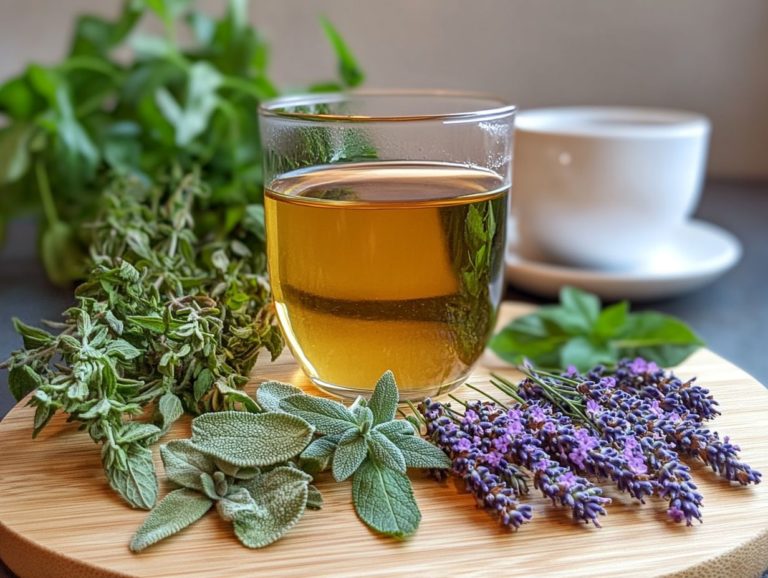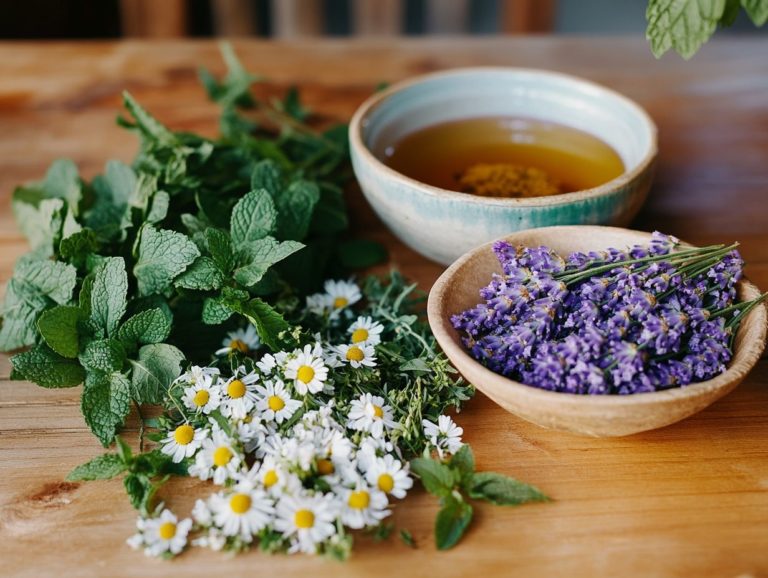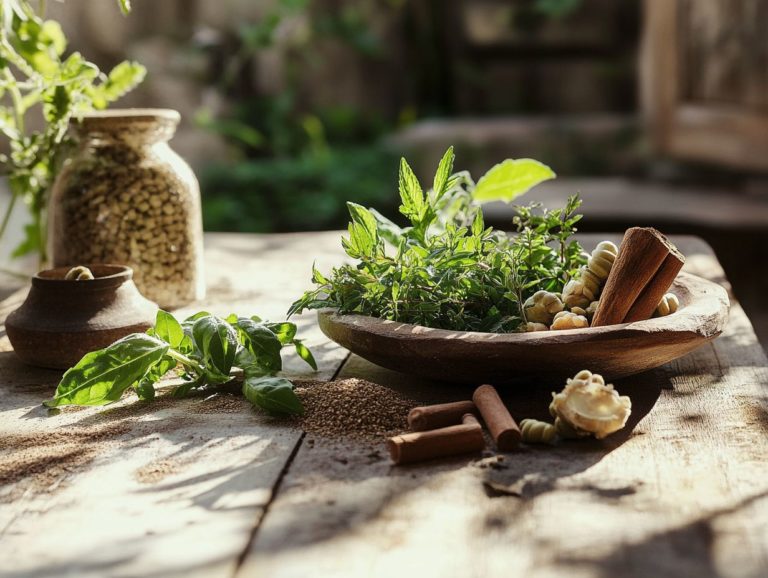Herbal Treatments for Ear Infections
Ear infections can be quite uncomfortable and frustrating, impacting individuals across all age groups.
Understanding the causes and types of these infections is your first step toward addressing them effectively. While conventional treatments are widely used, many people seek relief through traditional herbal remedies. This exploration delves into various herbal treatments, supported by scientific findings, and provides insights into their safe application.
Incorporating preventive measures, such as proper ear cleaning and monitoring allergens, can help prevent ear infections in susceptible individuals. Join in to uncover the power of herbs in managing ear infections.
Acute otitis media often strikes suddenly, bringing with it sharp pain and fever, particularly in children.
Contents
- Key Takeaways:
- What are Ear Infections?
- Traditional Herbal Treatments for Ear Infections
- Evidence-Based Herbal Treatments
- Using Herbal Treatments Safely
- Combining Herbal Treatments with Mainstream Medicine
- Preventing Ear Infections with Herbs
- Your Top Questions About Ear Infections Answered!
- What are herbal treatments for ear infections?
- Can herbal treatments really help with ear infections?
- What are some commonly used herbs for ear infections?
- Are there any potential side effects of using herbal treatments for ear infections?
- How can I use herbal treatments for ear infections?
- Are herbal treatments a substitute for medical treatment for ear infections?
Key Takeaways:
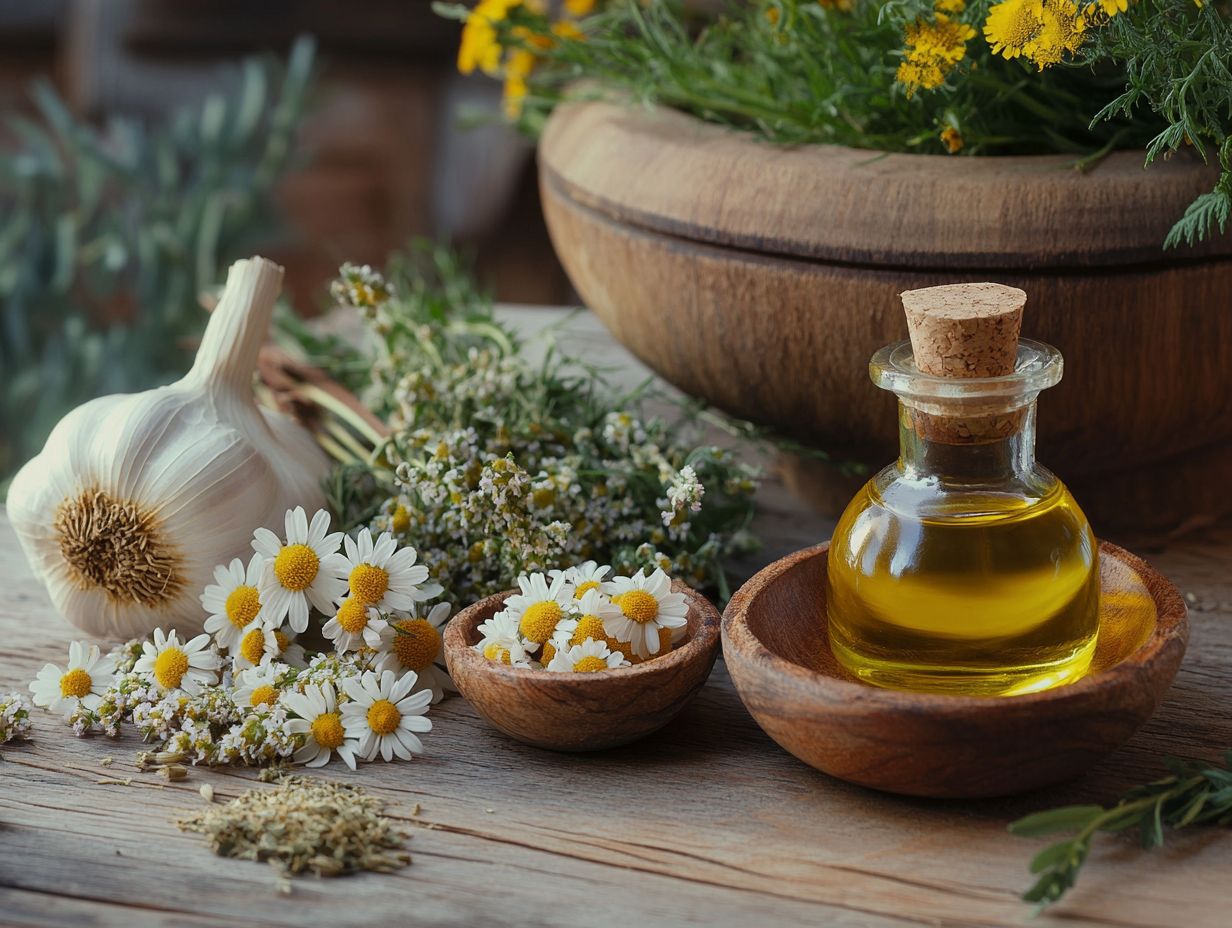
- Did you know herbs have been used for centuries to tackle ear infections? Discover traditional remedies like garlic, mullein, and tea tree oil that might help!
- Scientific studies show promising results for herbs like echinacea and elderberry as effective treatments for ear infections.
- When using herbal treatments for ear infections, it is important to do so safely and in conjunction with conventional medicine for maximum benefit and to prevent potential risks.
What are Ear Infections?
Ear infections, often referred to as otitis media, are common medical issues that arise when bacteria or viruses invade the space behind the eardrum. This results in inflammation and fluid accumulation in the middle ear, causing considerable discomfort, especially in children.
You might notice symptoms like ear pain, fever, and irritability. Understanding the causes and types of ear infections is essential for effective management, whether that means consulting a healthcare provider or exploring home remedies for relief.
Being aware of the potential complications from chronic ear infections is crucial for parents and caregivers alike.
Understanding the Causes and Types
Ear infections can arise from a variety of factors, including bacterial and viral infections, allergies, and structural problems such as problems with the eustachian tube. This dysfunction can lead to a troubling buildup of fluid in the middle ear.
When fluid accumulates, it creates a perfect breeding ground for germs, setting the stage for conditions like acute otitis media and chronic ear infections. Acute otitis media often strikes suddenly, bringing with it sharp pain and fever, particularly in children. On the other hand, chronic ear infections can linger for months or even years, leading to ongoing discomfort and the potential for hearing loss.
Several risk factors come into play exposure to secondhand smoke, frequent colds, and specific anatomical variations can make individuals more prone to recurrent inflammation. Keep an eye out for common symptoms such as ear pain, irritability in younger children, and, in some cases, discharge from the ear. This highlights the critical need for early diagnosis and effective management.
Explore your options! Herbal treatments for wound care could be the key to managing your ear infections effectively!
Traditional Herbal Treatments for Ear Infections
Traditional herbal treatments for ear infections present you with natural alternatives to conventional medicine, offering potential pain relief and supporting your body’s healing process. Ingredients like garlic oil, ginger juice, and hydrogen peroxide are often touted for their germ-fighting and pain-relieving benefits.
Apple cider vinegar is a popular home remedy. Tea tree oil has also gained popularity as an effective option. These natural options may help manage discomfort and inflammation, particularly for children, who might be more sensitive to pharmaceutical interventions.
Herbs Used in Folk Remedies
Folk remedies frequently harness the power of herbal extracts like garlic and ginger, celebrated for their antiseptic and anti-inflammatory properties. These herbs may help alleviate the symptoms associated with ear infections.
Garlic, in particular, has been revered in traditional medicine for ages. Often used in oil infusions for earaches, its compounds are thought to combat bacteria and provide a soothing effect when warmed and applied topically.
Meanwhile, ginger, known for its warming qualities, is best enjoyed as a tea preferably steeped to maximize potency. This delightful brew can enhance circulation, supporting your body’s natural healing process.
Don t overlook other gems like mullein and eucalyptus, which various cultures have embraced for their pain-relieving and germ-fighting benefits. Together, these herbs weave a rich tapestry of holistic treatments that draw from nature s own pharmacy.
Evidence-Based Herbal Treatments
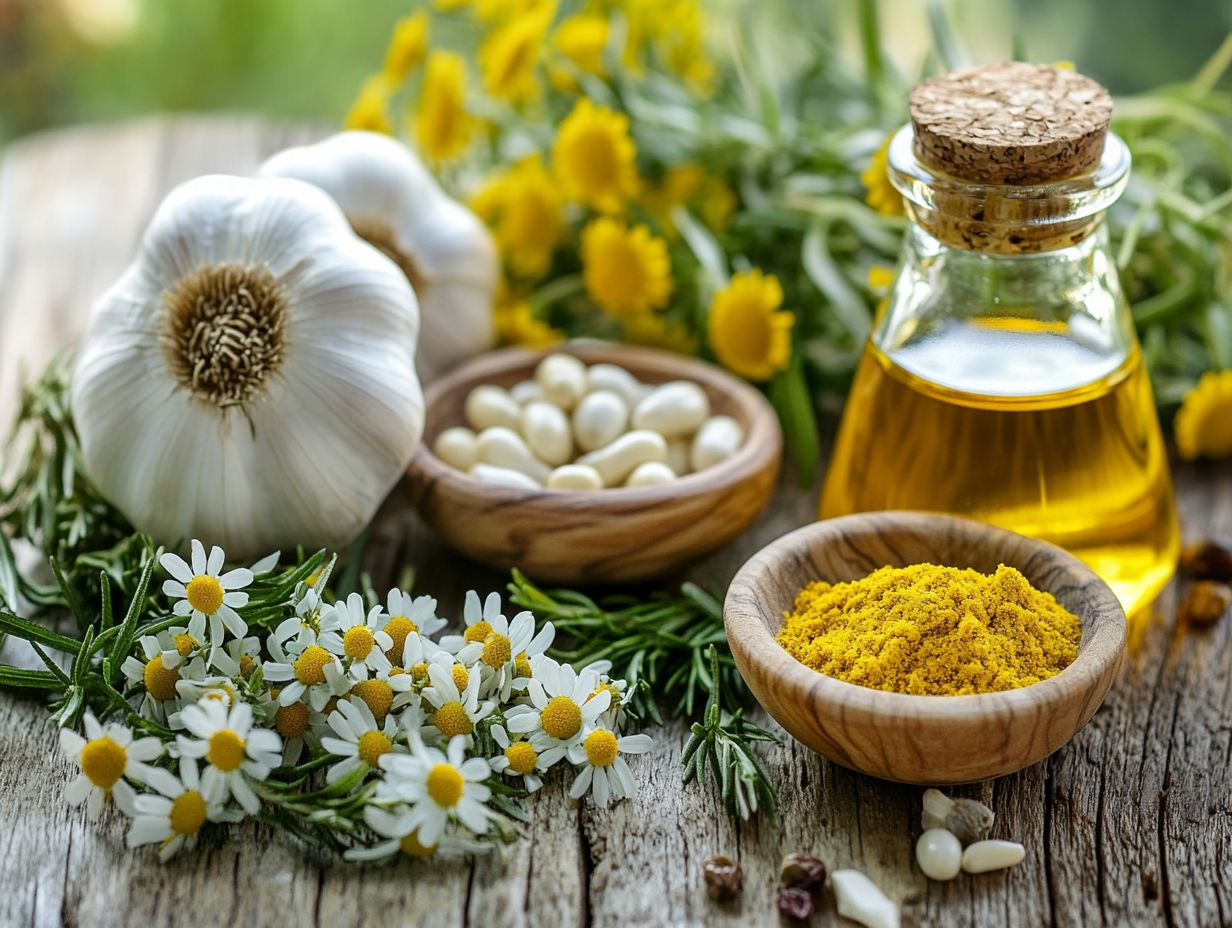
You may find that evidence-based herbal treatments are garnering significant attention for their potential effectiveness in managing ear infections. Scientific studies have begun to highlight the benefits of components such as garlic oil and ginger juice.
These natural remedies are being explored for their ability to alleviate pain and reduce inflammation, offering a complementary approach to conventional methods. They may help manage discomfort and inflammation, particularly for children, who might be more sensitive to pharmaceutical interventions.
Scientific Studies and Findings
Numerous scientific studies have delved into the effectiveness of herbal treatments like garlic oil and ginger in alleviating the symptoms of ear infections, revealing positive outcomes for discomfort relief.
These investigations often utilize randomized controlled trials to analyze the anti-inflammatory and pain-relieving properties of these natural remedies. For instance, garlic oil has shown significant antimicrobial activity against bacterial infections, while ginger effectively reduces inflammation through its natural compounds that help.
In one notable study, participants using garlic oil reported a considerable decrease in pain levels within just a few days of application, while those who incorporated ginger into their diets experienced enhanced comfort as well.
These findings show that herbal treatments can be effective alternatives for managing ear infection discomfort.
Using Herbal Treatments Safely
While herbal treatments can provide valuable benefits for ear infections, it’s essential to use them safely to mitigate potential risks and complications, particularly in children. It’s advisable to consult a healthcare provider before starting any herbal regimen, ensuring that it aligns with existing treatments. It s important to recognize that not all herbal remedies are safe for everyone, especially those with pre-existing health conditions.
Your well-being is paramount, and expert guidance can help you make informed decisions.
Precautions and Potential Risks
Understanding the precautions and potential risks associated with herbal treatments is essential, as some individuals may experience allergic reactions or interactions with prescription medications.
It s important to recognize that not all herbal remedies are safe for everyone, especially those with pre-existing health conditions or individuals who are pregnant or breastfeeding. Side effects can vary significantly, ranging from mild digestive disturbances to more serious complications. Consult a healthcare provider before starting any new herbal regimen to minimize risks.
This step ensures that any possible negative interactions with prescribed medications are taken into account, allowing for a safer and more effective integration of herbal medicine into your overall health strategy.
Combining Herbal Treatments with Mainstream Medicine
Combining herbal treatments with mainstream medicine can significantly enhance your pain management strategies for ear infections. However, take control of your health by approaching this integration with care and under the guidance of a healthcare provider.
This holistic method offers comprehensive care, effectively addressing both the symptoms you experience and the underlying causes.
Benefits and Considerations
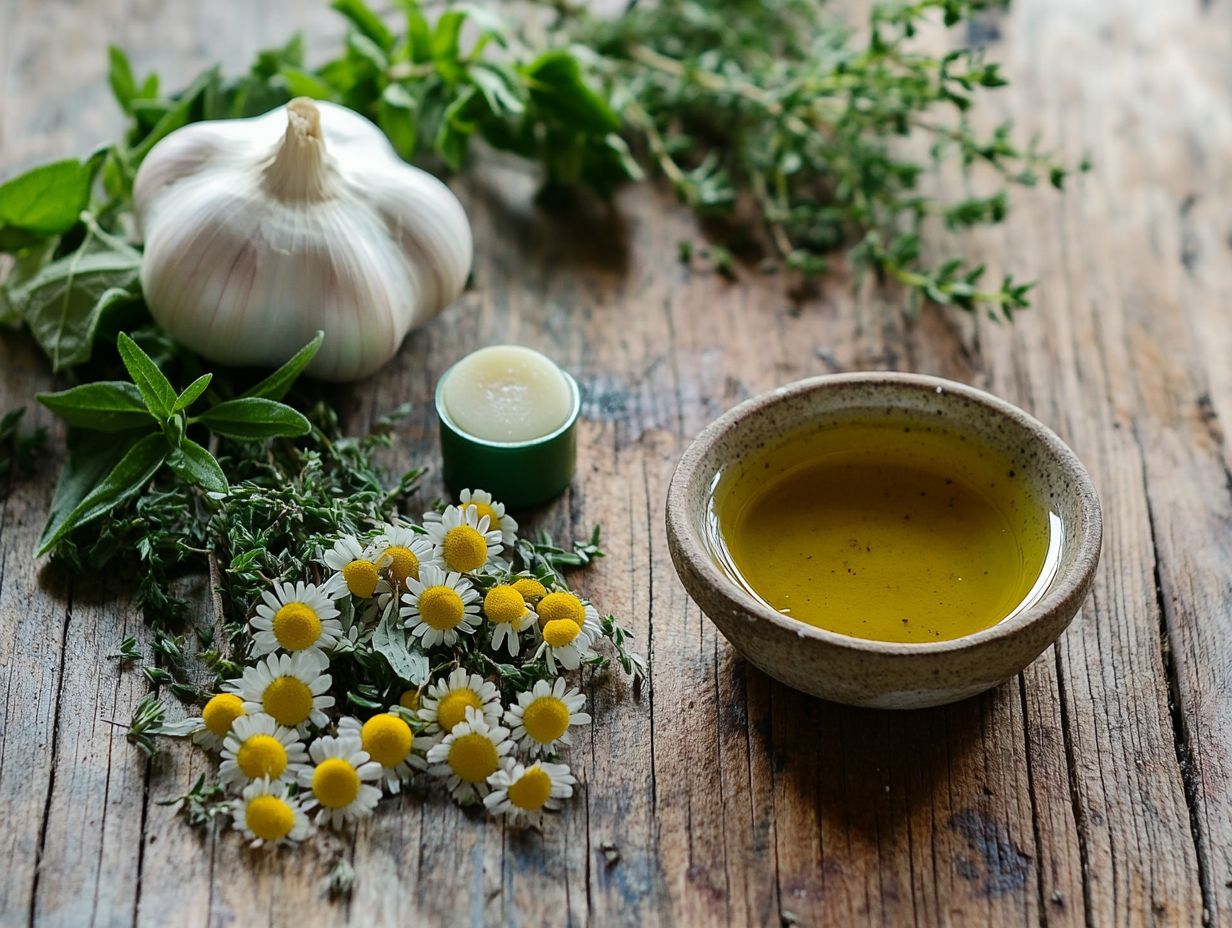
Combining herbal treatments with mainstream medicine for ear infections offers several advantages, including enhanced symptom relief. This holistic approach provides comprehensive care, effectively addressing both the symptoms you experience and the underlying causes of your condition. However, it s important to consider potential interactions and your individual health conditions.
By integrating herbal remedies like garlic oil or tea tree oil into your regimen, you might discover additional anti-inflammatory benefits that could boost the effectiveness of your treatments. These herbal treatments can also tackle underlying issues, such as strengthening your immune system and alleviating stress, ultimately promoting your overall wellness.
Don’t risk your health consult a healthcare provider today! Doing so ensures that safety remains a priority and that any possible risks of herbal interactions with your prescribed medications are properly evaluated. Making informed decisions will allow you to develop a supportive care strategy tailored specifically to your unique medical profile.
Preventing Ear Infections with Herbs
Preventing ear infections with herbs means embracing natural preventive measures that can enhance your immune system and lower your risk of infection. Herbal treatments can act as valuable complements to your ear health routine, especially when it comes to managing allergy symptoms and ensuring you stay properly hydrated to keep your eustachian tubes the tubes that help to equalize pressure in your ears functioning optimally. Using home remedies can also be effective in this regard.
Natural Preventative Measures
Natural preventative measures for ear infections involve maintaining proper hydration, exploring herbal treatments, and ensuring your immune system is strong to decrease susceptibility to infections. A cold compress can also provide effective pain relief.
Incorporating a balanced diet brimming with vitamins and minerals can significantly enhance your ear health. Foods rich in omega-3 fatty acids, like avocados and salmon, work wonders in reducing inflammation. Additionally, the antioxidants found in berries help protect delicate ear tissues. Using ginger juice can contribute to inflammation reduction.
Staying well-hydrated is essential for supporting mucus clearance and ensuring that your Eustachian tubes the tubes that help equalize pressure in your ears function optimally. Explore the benefits of herbal remedies such as garlic oil and ginger tea, known for their antimicrobial properties that may help fend off infections. Using hydrogen peroxide for ear cleaning can help maintain ear hygiene.
By combining these dietary elements with adequate fluid intake and herbal support, you can nurture your ear health and minimize the risk of recurring issues. Don’t wait! If you experience discomfort, consult your healthcare provider for guidance on pain management.
Your Top Questions About Ear Infections Answered!
What are herbal treatments for ear infections?
Herbal treatments for ear infections are natural remedies using plants, herbs, and other natural ingredients to alleviate symptoms, including earache relief and discomfort alleviation.
Can herbal treatments really help with ear infections?
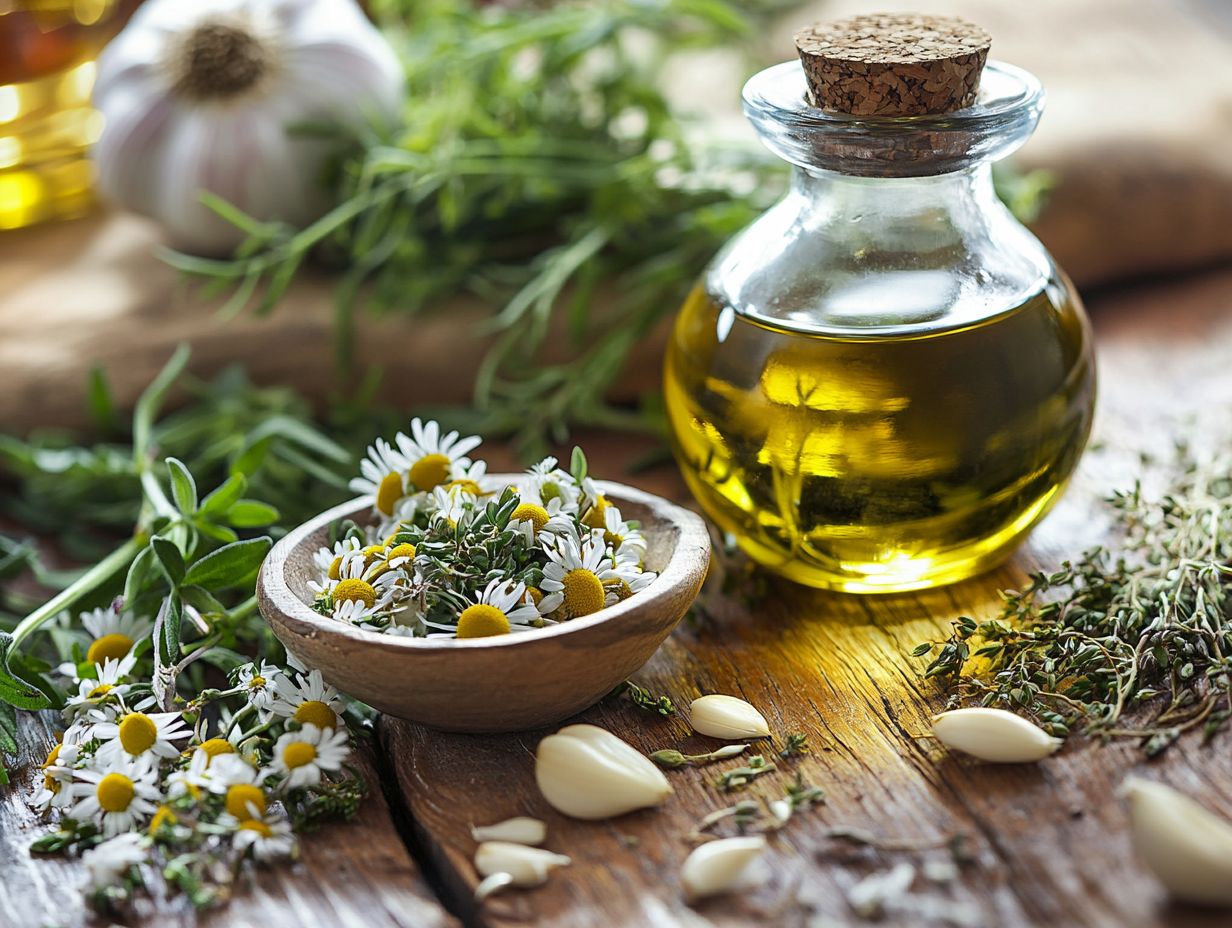
Yes, herbal treatments have a long history of use for many types of infections, including ear infections. Some herbs possess anti-inflammatory and antiseptic properties that can help reduce pain and combat the infection, making them suitable for bacterial infections like acute otitis media.
What are some commonly used herbs for ear infections?
- Garlic
- Mullein
- Echinacea
- Ginger
These herbs have antimicrobial properties that can help fight off ear infections and reduce symptoms associated with respiratory infections.
Are there any potential side effects of using herbal treatments for ear infections?
While herbal treatments are generally considered safe, some individuals may experience allergic reactions or digestive issues when using certain herbs. It’s important to consult with a healthcare professional or an otolaryngologist before using any herbal treatments, especially for children’s symptoms.
How can I use herbal treatments for ear infections?
Herbal treatments for ear infections can come in the form of ear drops, teas, or tinctures. These can be applied directly to the ear or ingested orally. For additional pain relief, medications like ibuprofen or acetaminophen may also be recommended.
Are herbal treatments a substitute for medical treatment for ear infections?
No, herbal treatments should not replace medical treatment for ear infections. In severe cases, medical intervention, such as antibiotics, may be necessary to effectively treat the infection. Always consult with a healthcare provider before trying any herbal treatments.
Take charge of your ear health today!



